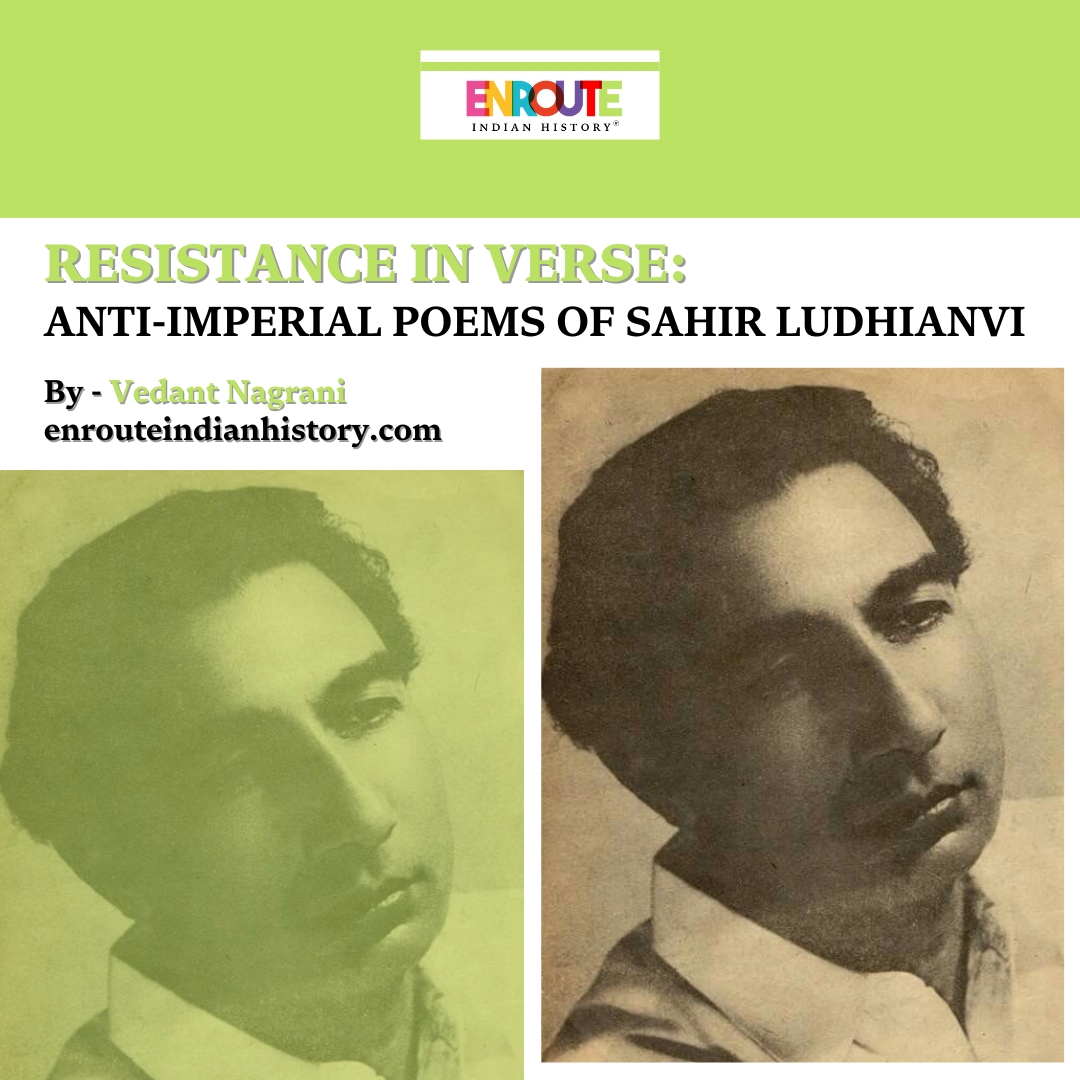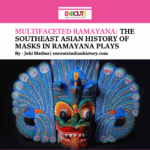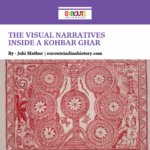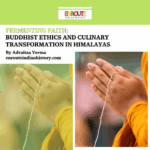Resistance in Verse: Anti-Imperial Poems of Sahir Ludhianvi
- EIH User
- August 23, 2024


- Sahir Ludhianvi
वो सुब्ह हमीं से आएगी
जब धरती करवट बदलेगी जब क़ैद से क़ैदी छूटेंगे
जब पाप घरौंदे फूटेंगे जब ज़ुल्म के बंधन टूटेंगे
उस सुब्ह को हम ही लाएँगे वो सुब्ह हमीं से आएगी
वो सुब्ह हमीं से आएगी
The dawn will come through us,
When the world turns over, when the prisoners are set free;
When the huts of sin crumble and the bonds of tyranny break,
We will bring that dawn; it will come through us,
That dawn will come through us.
- Sahir Ludhianvi, trans. Carlo Coppola
Sahir Ludhianvi
The aforementioned excerpt has been taken from Sahir Ludhianvi’s song “Woh Subah Kabhi To Aayegi” from the 1958 film Phir Subah Hogi. The song does not merely give the listeners hope but, as the refrain “Woh Subah Humi Se Aayegi/The dawn will come through us” re-affirms, is also supposed to remind us of our own role in and power of bringing change and revolution in socio-political structures of power. Though Sahir hopes for a revolution in India both before and after freedom from the colonial rule in this song, his own contribution to Indian literature has also been that of a revolutionary as the Marxist anti-imperial ideological base in his poems coupled with his revolutionary spirit ushered in a new dawn for Indian literature with the Progressive Writers’ Movement in the late 1930s. This essay analyzes the role of anti-imperial poems and lyrics of Sahir Ludhianvi in the Indian freedom struggle. It also explores their larger implications on a struggle for freedom of the oppressed masses even after India had achieved freedom from British imperialism.
Since the origins of literature both, in India and the rest of the world, the relationship between the written word and the state/politics has been a strained one. Literary texts have been used to both advance state propaganda and also to vehemently oppose it. With the British colonial occupation of India and Indian culture, Indian literature was, for a long period of time, influenced by and based on the standards of Western and European literature written with a glaringly visible Oriental lens governed by white supremacist attitudes of race. Though there were several writers like Rabindranath Tagore, Henry Derozio, and Sarojini Naidu who opposed colonial rule with their writings, there was a severe lack of a sustained literary movement against British imperialism due to the severe censorship laws. This changed with the emergence of the Progressive Writers’ Association (PWA) in 1935. As opposed to the earlier trends in Indian literature of “art for its own sake”, the PWA explored the significance of literature in questioning and challenging systems of power and oppression in Indian society such as patriarchy, caste system, capitalism, etc. The PWA was also largely inspired by Marxism and was rooted in anti-imperial ideas and struggles. The writers of PWA envisaged an Indian literature that, in its first president Premchand’s words, would change the standards of beauty in the written word, and not only seek to reflect the exploitation of the oppressed in Indian society but also to resist it.
One of the most significant writers of the PWA apart from Ismat Chughtai, Munshi Premchand, Sajjad Zaheer, and Faiz Ahmed Faiz, was Sahir Ludhianvi. Born in Ludhiana and often spoken about in the same breath as Faiz Ahmed Faiz due to the revolutionary spirit in his poems that he often conflated with love. Further, Sahir was one of the very few progressive writers who continued to write and strive for freedom of all, even after the decline of the Progressive Writers’ Movement and after India achieved freedom. In fact, though he wrote several poems of love in his early days, as India got closer and closer to freedom, his sense of delusion with a romantic love that was unaffected from the outer world started to shatter. His idea of love was beyond the typical asocial romantic love and it was based on a humanistic and liberating love to an extent that in his later poems, it becomes difficult to distinguish love from revolution and liberation. Hence, Sahir’s poetics is based on what Dharmendra Kumar and Binod Mishra call “a reification of love”.
For instance, one of his most famous anti-imperial and anti-war poems Parchhaaiyaan (The Shadows) published in 1955 but believed to have been written around 1945, revolves around two ordinary and innocent lovers who find themselves suddenly caught in a war that not only separates them but also dehumanises them. According to Ali Sardar Jafri, another progressive writer, who wrote the preface to the poem, Sahir’s “success arises from the directness of his expression aimed at capturing the harsh realities of our time … The poetic technique used is also new and has not been employed by any other Urdu poet.”
Sahir uses striking imagery and an interplay of several senses to describe the impact of imperialism on people and the landscape of the oppressed:
From the civilized countries of the west
came some uniformed officers—
boasting, cheering, and swaying.
Ropes of tents were thrust
into the heart of the silent fields.
Soft paths were scarred
from people walking wearing heavy boots.
The horrifying military bands
overwhelmed the delicate sound
of the spinning wheel.
The fiery dust raised by the passing jeeps
drowned the apparel of flowers.
Human beings became cheap,
produce became expensive.
As Parchhaaiyaan also shows, Sahir was interested in both the conflation of love and revolution as well as the economic impact of the dual forces of imperialism and capitalism on the oppressed people. His major contributions to the freedom struggle lie in his intense depictions of the dehumanization of people as a result of oppression by the imperial and capitalist forces. In another poem Bangaal, Sahir, as the scholar Rakshanda Jalil notes, “talks of this land of plenty that has known such horrific wants because of the rapacity of its rulers. Sahir talks of the peasants in the fields and the workers in the factories, the glittering new roads and fertile lands and referring to the role played by Bengalis in the national freedom struggle and the natural propensity of the people of Bengal towards ehtijaaj (protest), goes on to ask”:
Chaman ko iss liye maali ne ḳhuun se seencha thha
Ki uss ki apni nigahein bahaar ko tarsein
Was it for this day the gardener had watered the garden with his blood
That his own eyes should yearn for spring”
Sahir’s struggle for freedom, unlike many PWM writers, continued even after India attained freedom from the British Raj as Sahir identified the cause of oppression to be the ideology of imperialism and capitalism that took newer forms post-1947. His understanding of freedom is broad enough for him to realise that freedom of some does not equate to freedom for all, as caste oppression, caste inequalities, and gender inequity continued in independent India. Sahir’s literary rebellion took a new and significant shape in the late 1940s with his work as a lyricist in the Hindi film industry. With his songs and poems, he continued to struggle for freedom and to interrogate the very idea of freedom. For instance, one of his most famous lyrics ‘Jinhe Naaz Hain Hind Par’ from the 1957 film Pyaasa asks some pertinent questions:
मदद चाहती है ये हव्वा की बेटी
यशोदा की हमजिंस, राधा की बेटी
पयम्बर की उम्मत, ज़ुलयखां की बेटी
जिन्हें नाज़ है हिन्द पर वो कहां हैं
ज़रा मुल्क के रहबरों को बुलाओ
ये कुचे, ये गलियां, ये मंजर दिखाओ
जिन्हें नाज़ है हिन्द पर उनको लाओ
जिन्हें नाज़ है हिन्द पर वो कहां हैं
This daughter of eve cries out for help
The twin of Yashoda, the daughter of Radha
Follower of the Prophet, the daughter of Zulaikha
Those who are proud of Hind
Where are they,
Where are they?
The leaders of the nation, call them please
Just show them these lanes, these streets, these scenes
Those who are proud of Hind
Where are they,
Where are they?
The song was also adapted by the singer Rabbi Shergill in 2008 to express his anguish at the gangrape of Bilqis Bano in 2002, and at the murder of several IAS officers and activists such as Satyendra Dubey, Anna Manujnath and Navleen Kumar.
Sahir Ludhianvi is a timeless poet and revolutionary whose verses and ideas give strength to millions of people to strive for a better world. His understanding of and commitment to anti-imperial struggles is commendable as he restlessly continued to strive for freedom even post-Independence with his songs. His work in the film industry as a lyricist further depicts his commitment to his ideas and people, as the film industry was in its nascent stage back then and any association with it was looked down upon. With the ongoing genocide in Palestine as a result of imperialist forces, Sahir’s poem ‘Khoon Phir Khoon Hai’ (Blood, However, is Blood) written on the murder of the Congolese PM Patrice Lumumba, a symbol of his internationalist attitude and trans-national solidarity, seems fitting to remember:
Zulm phir zulm hai, badhta hai to mit jaata hai
Khoon phir khoon hai, tapkega to jam jaayega
Tum ne jis khoon ko maqtal meiñ chupaana chaaha
Aaj voh koocha-o baazaar meiñ aa nikla hai
Kahiñ shola, kahiñ naara, kahiñ patthar ban kar
Khoon chalta hai to rukta nahiñ sangeenoñ se
Sar uthaata hai to jhukta nahiñ aaeenoñ se
Zulm ke baat hi kya, zulm ki auqaat hi kya
Zulm bas zulm hai aaghaaz se anjaam talak
Khoon phir khoon hai, sau shakl badal sakta hai
Aisi shakleñ ke mitaao to mitaaye na bane Aise sholay ke bujhaao to bujhaaye na bane
Aise naare ke dabaao to dabaaye na bane
Tyranny is but tyranny; when it grows, it is vanquished
Blood however is blood; if it spills, it will congeal
That blood which you wished to bury in the killing fields
Has risen today in the streets and the courts
Somewhere as a flame, somewhere as a slogan, somewhere else as a flung stone
When blood flows, bayonets cannot contain it
When it raises its defiant head, laws will not restrain it
Tyranny has no caste, no community, no status nor dignity
Tyranny is simply tyranny, from its beginning to its end
Blood however is blood; it becomes a hundred things:
Shapes that cannot be obliterated
Flames that can never be extinguished
Chants that will not be suppressed
-Sahir Ludhianvi
Bibliography and References
- Jalil, Rakshanda. “Bangaal ka Jaadu.” Love in the Time of Hate: In the Mirror of Urdu. Simon & Schuster, 2024.
- Manwani, Akshay. “Of Poetry and Progressive Literature.” Sahir Ludhianvi: The People’s Poet. Harper Collins, 2013.
- Deol, Surinder. “Poems: War and Peace.” Sahir: A Literary Portrait. Oxford University Press, 2019.
- Coppola, Carlo. “Sahir Ludhianvi.” Mulosige, http://mulosige.soas.ac.uk/resources/translations/poems-by-author/sahir-ludhianvi-2/ .
- Naeem, Raza. “The Poem That Forced Sahir Ludhianvi to Leave Lahore Forever,” Janata Weekly, 1 Nov. 2020,
https://janataweekly.org/the-poem-that-forced-sahir-ludhianvi-to-leave-lahore-forever/ .
- Rajoria, Vinay. “On the Poetry of Sahir Ludhianvi: The Personal and the Political.” The Jamia Review,
https://www.thejamiareview.com/on-the-poetry-of-sahir-ludhianvi-the-personal-and-the-political/ .
- Kumar, Dharmendra, and Binod Mishra. “Reification of Love: Select Poetry of Sahir Ludhianvi.” International Journal of Research- GRANTHAALAYAH, vol. 12, no. 3, pp. 53-64,
https://dx.doi.org/10.29121/granthaalayah.v12.i3.2024.5551 .
- Mir, Raza, and Ali Husain Mir. “From Home to the World: The Internationalist Ethos.” Anthems of Resistance: A Celebration of Urdu Progressive Poetry, Roli Books, 2006, pp. 15-22.
- Mukherjee, Partha. “Stepping Towards Progress: The Progressive Writers’ Movement in Late Colonial India.” Vidyasagar University Journal of History, vol. 7, pp. 85-100.
- Anti-colonial poetry Sahir Ludhianvi
- Anti-imperial poetry India
- Freedom struggle poetry India
- Indian freedom struggle poems
- Indian independence poetry
- Sahir Ludhianvi anti-imperial poems
- Sahir Ludhianvi freedom poems
- Sahir Ludhianvi Indian freedom struggle
- Sahir Ludhianvi resistance poetry
- Sahir Ludhianvi revolutionary poems



















